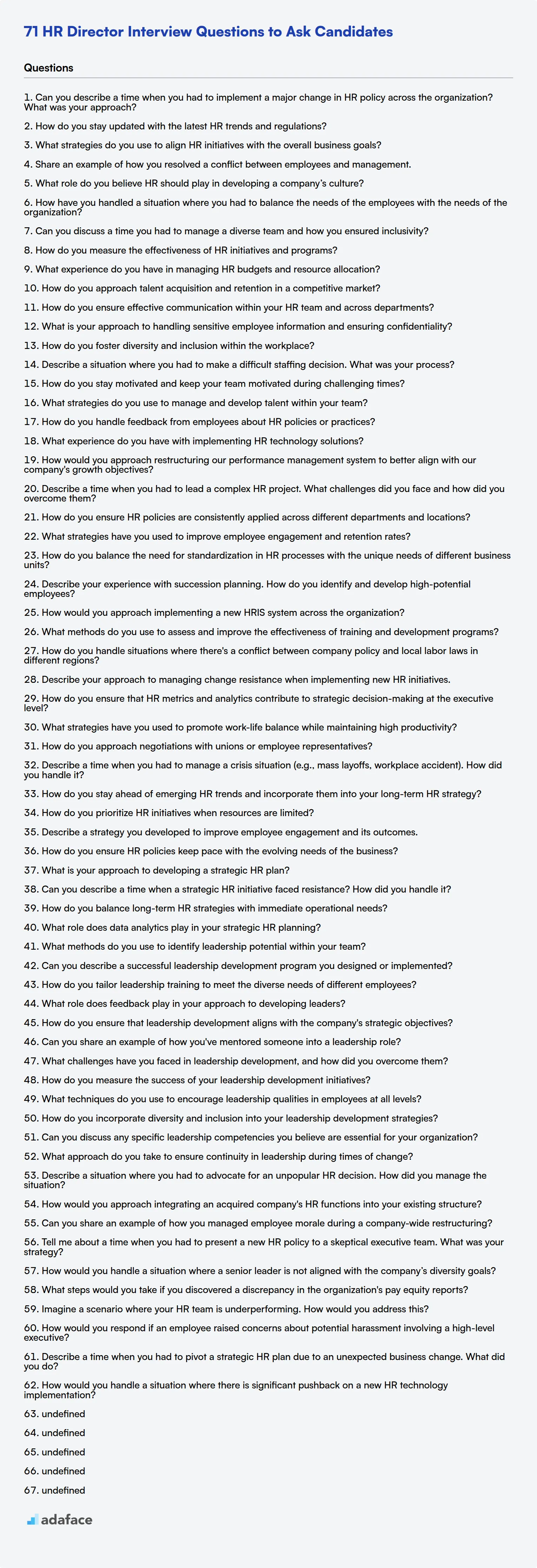In today's dynamic workplace, identifying the right HR Director is crucial for any organization striving for success. Knowing the skills required for an HR Director can help streamline your hiring process and avoid costly recruitment mistakes.
This blog post will equip you with a comprehensive set of HR Director interview questions tailored to various experience levels and expertise areas. From evaluating junior directors to exploring strategic planning capabilities in top candidates, we've got you covered.
By leveraging these targeted questions, recruiters and hiring managers can confidently assess candidates' skills and fit for the role. Additionally, using our HR assessment test can enhance your pre-interview screening process, ensuring you select the most promising candidates.
Table of contents
10 HR Director interview questions to initiate the interview
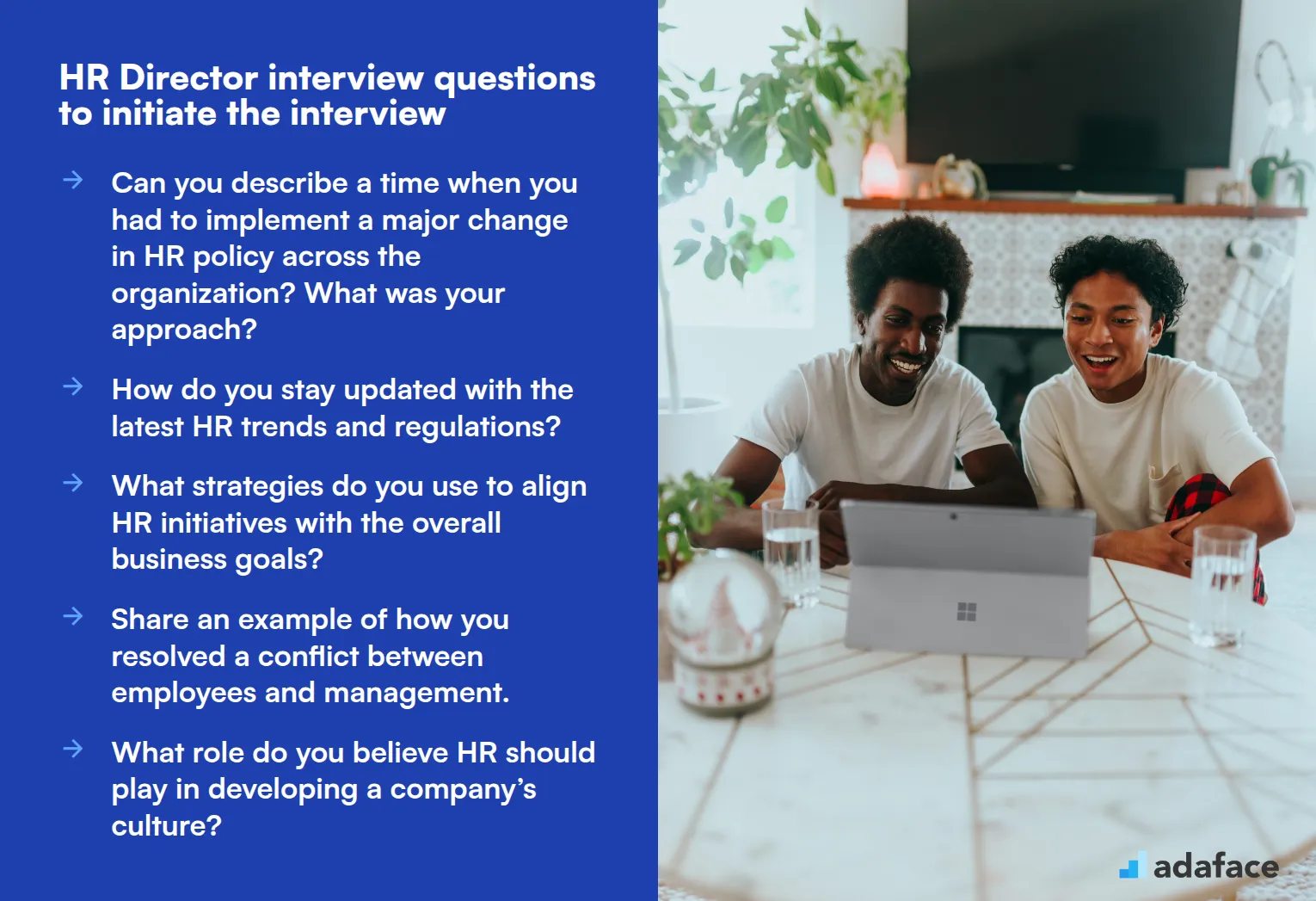
To ensure you identify the ideal candidate for the HR Director role, use these insightful interview questions. They are designed to help recruiters and hiring managers evaluate key competencies and strategic thinking necessary for effective leadership in human resources.
- Can you describe a time when you had to implement a major change in HR policy across the organization? What was your approach?
- How do you stay updated with the latest HR trends and regulations?
- What strategies do you use to align HR initiatives with the overall business goals?
- Share an example of how you resolved a conflict between employees and management.
- What role do you believe HR should play in developing a company’s culture?
- How have you handled a situation where you had to balance the needs of the employees with the needs of the organization?
- Can you discuss a time you had to manage a diverse team and how you ensured inclusivity?
- How do you measure the effectiveness of HR initiatives and programs?
- What experience do you have in managing HR budgets and resource allocation?
- How do you approach talent acquisition and retention in a competitive market?
8 HR Director interview questions and answers to evaluate junior directors
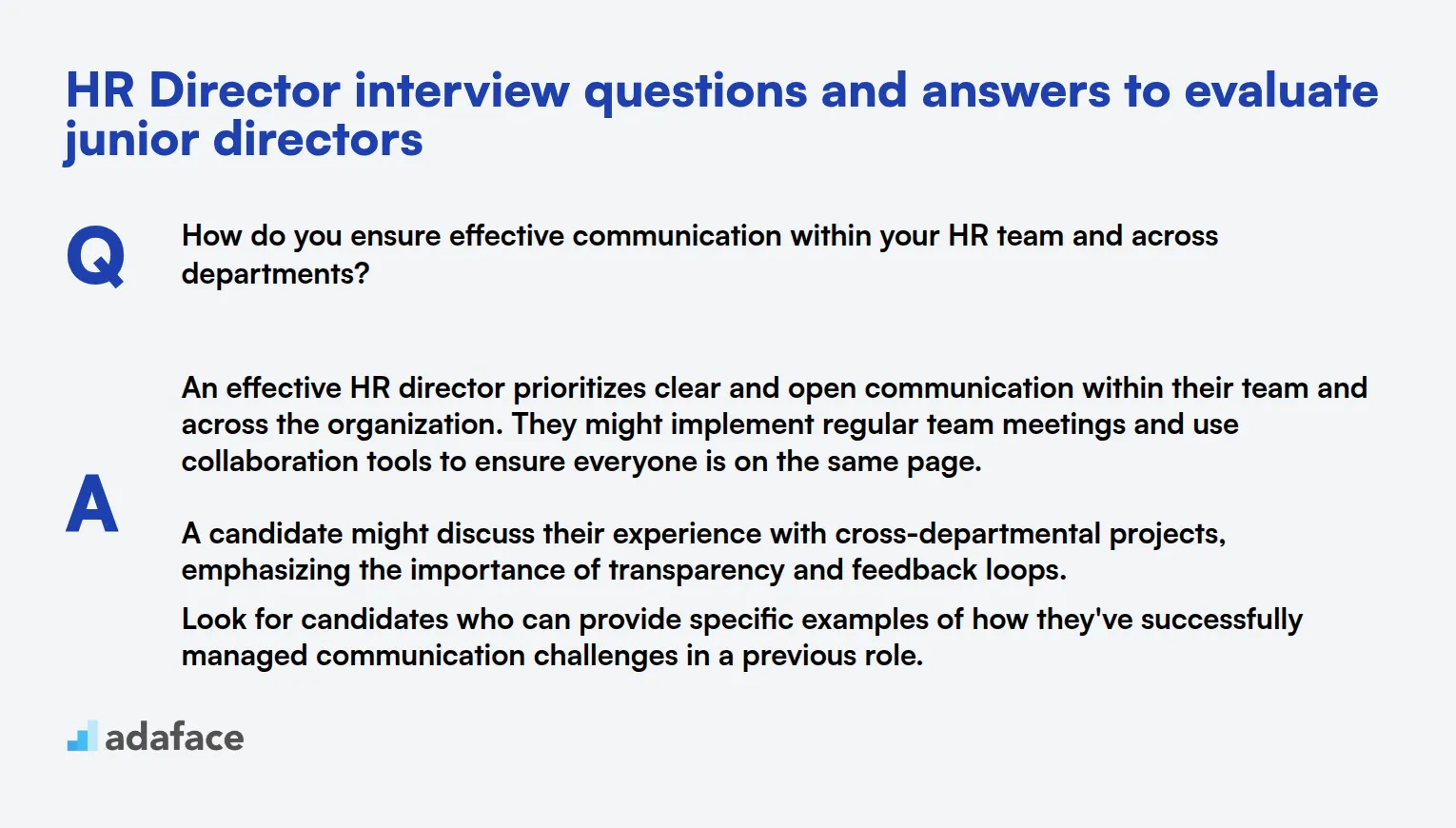
To determine if your junior HR directors have what it takes to lead with confidence and finesse, use these carefully crafted questions. They are designed to reveal insights into their leadership style, decision-making skills, and ability to align HR strategies with organizational goals.
1. How do you ensure effective communication within your HR team and across departments?
An effective HR director prioritizes clear and open communication within their team and across the organization. They might implement regular team meetings and use collaboration tools to ensure everyone is on the same page.
A candidate might discuss their experience with cross-departmental projects, emphasizing the importance of transparency and feedback loops.
Look for candidates who can provide specific examples of how they've successfully managed communication challenges in a previous role.
2. What is your approach to handling sensitive employee information and ensuring confidentiality?
A thorough understanding of data privacy laws and company policies is crucial for handling sensitive employee information. Candidates should describe how they safeguard this data through secure systems and access controls.
They might also discuss training programs they’ve implemented to educate team members on confidentiality protocols.
Ideal candidates will discuss a blend of technological solutions and human checks to maintain confidentiality, showing their understanding of both technical and ethical considerations.
3. How do you foster diversity and inclusion within the workplace?
Building a diverse and inclusive environment requires intentional strategies such as diverse recruitment channels, bias training, and inclusive policy development.
Candidates should share their experiences in creating programs or initiatives that promote diversity, such as mentorship programs or diversity committees.
Look for candidates who can articulate the tangible benefits of diversity and inclusion, such as improved team performance and employee satisfaction.
4. Describe a situation where you had to make a difficult staffing decision. What was your process?
Difficult staffing decisions require a balance between empathy and business needs. Candidates should explain how they gather and analyze data, consult with stakeholders, and consider long-term impacts before making decisions.
A candidate might discuss a specific instance where they had to make a tough call, highlighting their decision-making process and the outcome.
An ideal response will showcase the candidate's ability to navigate complex situations with both strategic insight and compassion.
5. How do you stay motivated and keep your team motivated during challenging times?
Maintaining motivation during tough times often involves setting clear goals, recognizing achievements, and fostering a supportive team culture.
Candidates might discuss their methods for staying positive and proactive, such as regular check-ins and creating a sense of purpose around the team's work.
Look for candidates who demonstrate resilience and an understanding of motivational strategies, as these are key traits for effective leadership.
6. What strategies do you use to manage and develop talent within your team?
Effective talent management involves identifying skill gaps, providing development opportunities, and creating career progression plans.
Candidates should talk about mentorship, coaching, and training programs they've used to foster talent within their team.
Seek candidates who can provide specific examples of successful talent development initiatives and discuss how they measure their impact.
7. How do you handle feedback from employees about HR policies or practices?
Constructive feedback is an opportunity for growth. Candidates should describe how they actively solicit and respond to employee feedback to improve HR policies.
They might share an example of how feedback led to a positive change in a policy or practice, highlighting their openness to new ideas.
Ideal candidates will show they value feedback as a tool for continuous improvement, demonstrating their commitment to a responsive and adaptive HR environment.
8. What experience do you have with implementing HR technology solutions?
Implementing HR technology requires a strategic approach to selecting and integrating solutions that meet organizational needs.
Candidates should discuss their experience with specific HR software and the impact it had on streamlining processes and enhancing efficiency.
Look for candidates who not only understand the technical aspects but can also articulate the benefits and challenges of adopting new technologies in HR.
15 intermediate HR Director interview questions and answers to ask mid-tier directors.
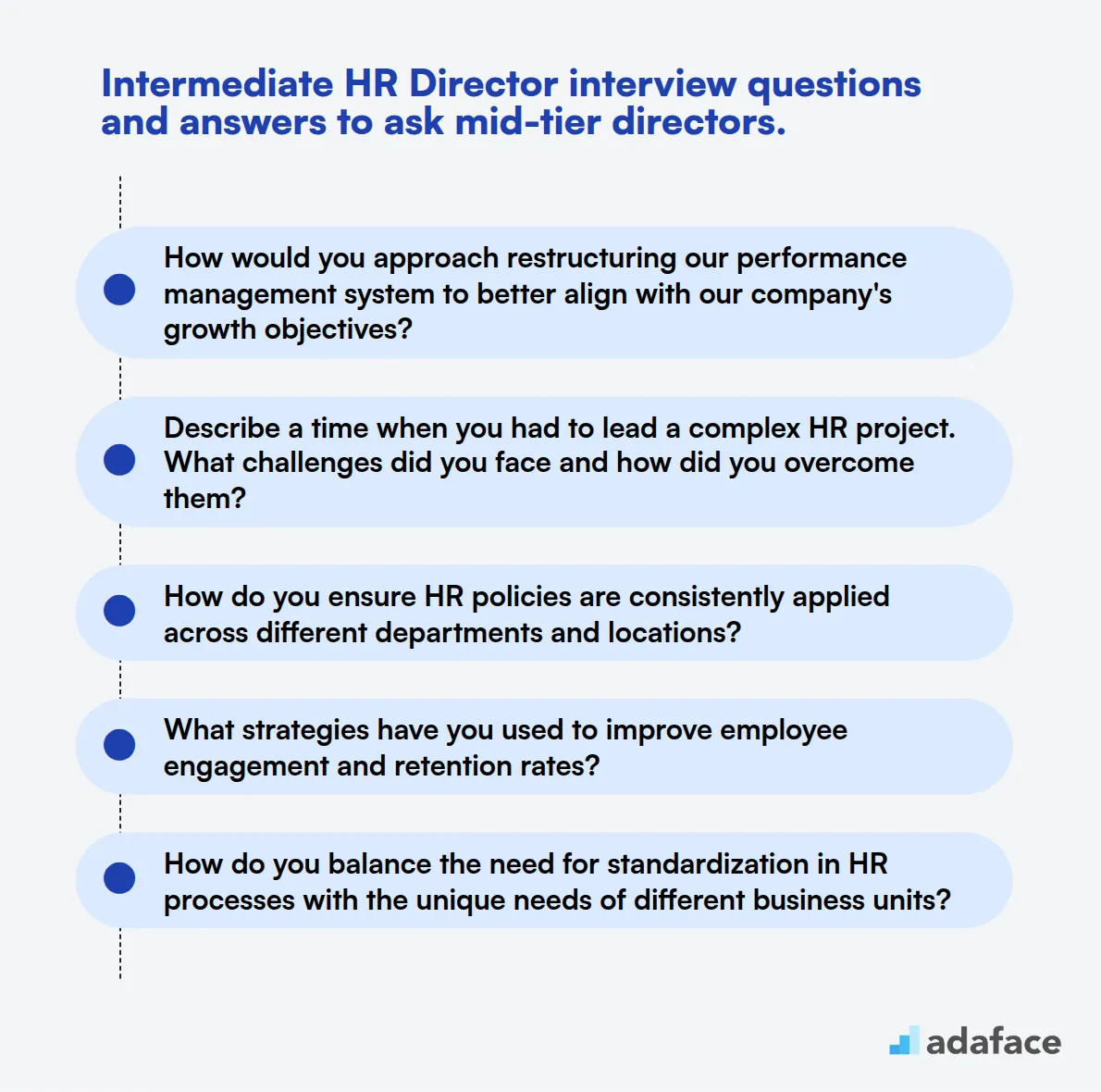
To assess mid-tier HR Director candidates effectively, use these 15 intermediate interview questions. These questions will help you gauge their strategic thinking, problem-solving abilities, and leadership skills in real-world HR scenarios.
- How would you approach restructuring our performance management system to better align with our company's growth objectives?
- Describe a time when you had to lead a complex HR project. What challenges did you face and how did you overcome them?
- How do you ensure HR policies are consistently applied across different departments and locations?
- What strategies have you used to improve employee engagement and retention rates?
- How do you balance the need for standardization in HR processes with the unique needs of different business units?
- Describe your experience with succession planning. How do you identify and develop high-potential employees?
- How would you approach implementing a new HRIS system across the organization?
- What methods do you use to assess and improve the effectiveness of training and development programs?
- How do you handle situations where there's a conflict between company policy and local labor laws in different regions?
- Describe your approach to managing change resistance when implementing new HR initiatives.
- How do you ensure that HR metrics and analytics contribute to strategic decision-making at the executive level?
- What strategies have you used to promote work-life balance while maintaining high productivity?
- How do you approach negotiations with unions or employee representatives?
- Describe a time when you had to manage a crisis situation (e.g., mass layoffs, workplace accident). How did you handle it?
- How do you stay ahead of emerging HR trends and incorporate them into your long-term HR strategy?
7 HR Director interview questions and answers related to strategic planning
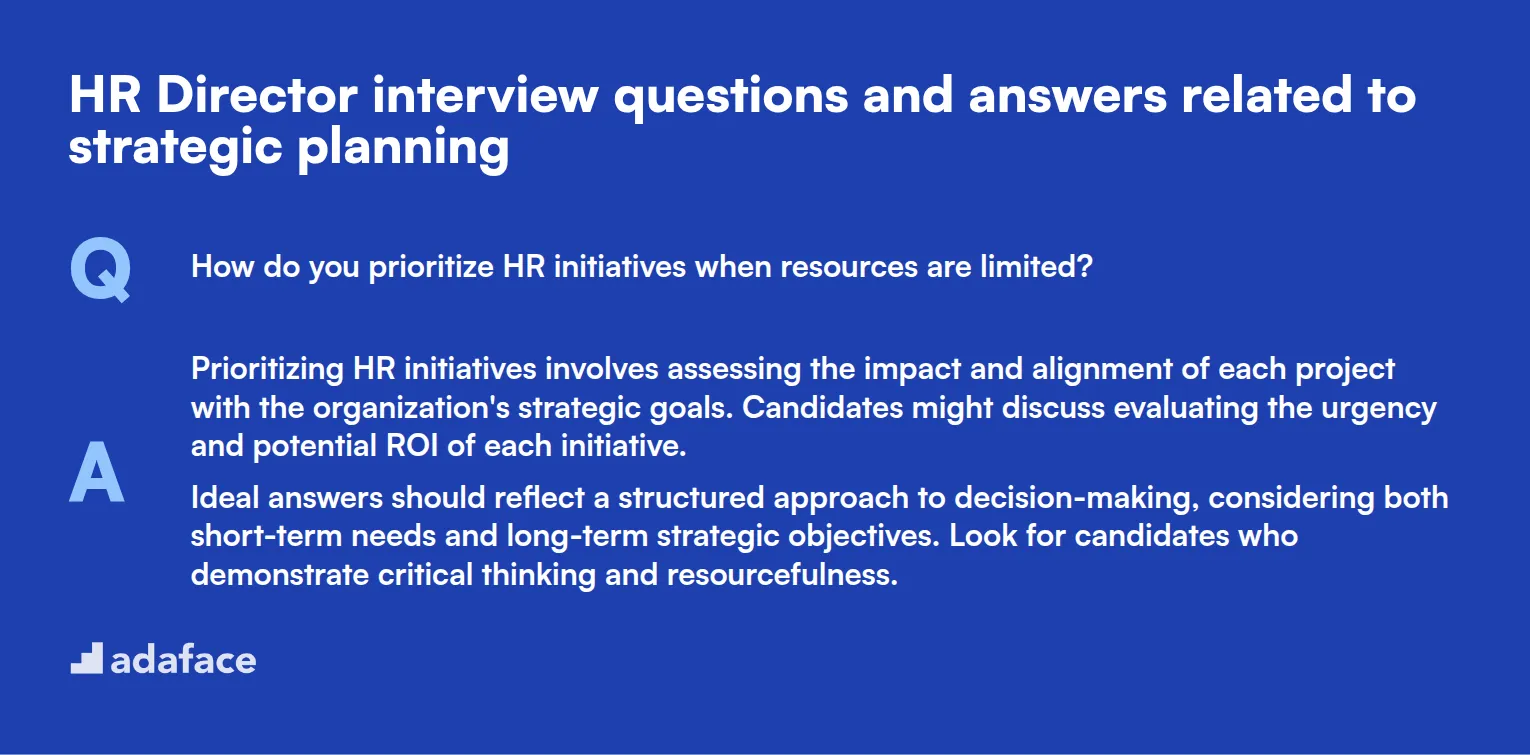
Strategic planning is like plotting a treasure map for your company's future. To ensure you find the right navigator for this journey, use these HR Director interview questions. They help you gauge a candidate’s ability to steer your organization towards success by aligning HR strategies with overall business goals.
1. How do you prioritize HR initiatives when resources are limited?
Prioritizing HR initiatives involves assessing the impact and alignment of each project with the organization's strategic goals. Candidates might discuss evaluating the urgency and potential ROI of each initiative.
Ideal answers should reflect a structured approach to decision-making, considering both short-term needs and long-term strategic objectives. Look for candidates who demonstrate critical thinking and resourcefulness.
2. Describe a strategy you developed to improve employee engagement and its outcomes.
Candidates should detail a specific strategy they implemented, such as introducing flexible work arrangements or launching an employee recognition program. They should explain the steps taken and the positive impact on employee morale and retention.
Strong responses will include measurable outcomes, like increased engagement scores or reduced turnover rates. Look for candidates who can articulate the connection between their strategy and business performance.
3. How do you ensure HR policies keep pace with the evolving needs of the business?
Ensuring HR policies evolve requires continuous monitoring of both internal business changes and external industry trends. Candidates may discuss regular policy reviews and incorporating feedback from leadership and employees.
An ideal candidate will showcase adaptability and foresight, emphasizing the importance of proactive updates to HR policies that support business agility and align with HR trends.
4. What is your approach to developing a strategic HR plan?
Developing a strategic HR plan involves understanding the company’s vision and aligning HR goals with business objectives. Candidates might describe performing SWOT analyses and setting clear, actionable goals.
Look for responses that highlight a comprehensive approach, including stakeholder collaboration and data-driven decision-making. A candidate should demonstrate the ability to create a roadmap that supports organizational growth.
5. Can you describe a time when a strategic HR initiative faced resistance? How did you handle it?
Handling resistance involves understanding the root concerns and communicating the benefits of the initiative. Candidates should describe using negotiation and communication skills to engage stakeholders and gain buy-in.
Effective answers will show empathy and problem-solving skills, revealing how the candidate managed to align differing viewpoints and move forward with the initiative.
6. How do you balance long-term HR strategies with immediate operational needs?
Balancing long-term and short-term goals involves strategic prioritization and flexibility. Candidates might discuss setting clear priorities and maintaining open communication with departments to address urgent needs without losing sight of strategic objectives.
Strong candidates will display a pragmatic approach, demonstrating how they can adapt strategies to meet both immediate and future challenges effectively.
7. What role does data analytics play in your strategic HR planning?
Data analytics is crucial for informed decision-making in HR. Candidates should discuss using data to identify trends, forecast future needs, and measure the impact of HR initiatives.
Ideal responses will highlight specific tools or metrics they use and how data has driven improvements in HR processes and overall business strategies.
12 HR Director interview questions about leadership development
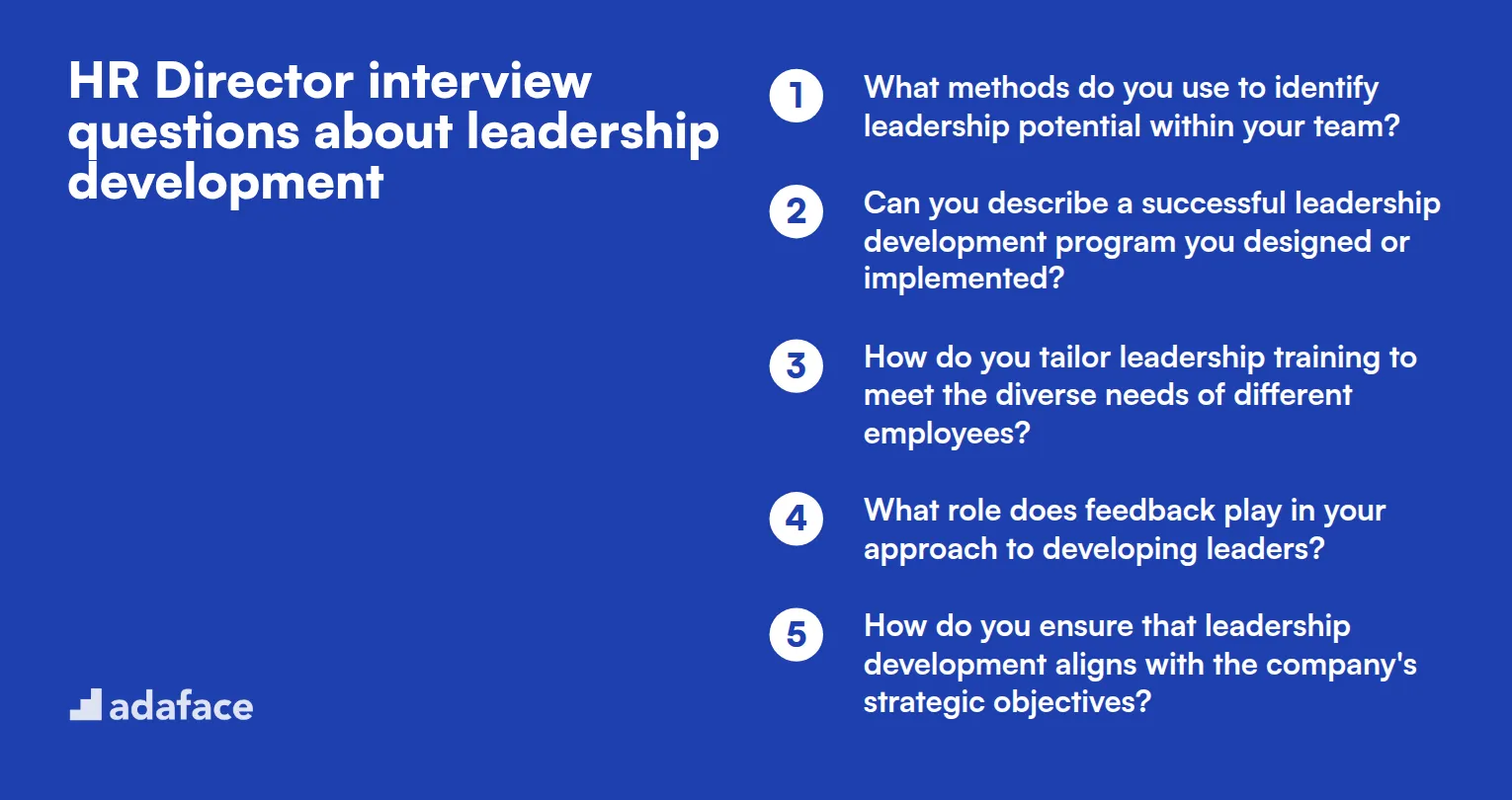
To gauge a candidate's ability to nurture and develop talent within the organization, incorporate these HR Director interview questions about leadership development. These questions will help you assess their strategic thinking and commitment to growing future leaders, ensuring your team is well-prepared for success. For a more comprehensive view of the role, consider referring to the HR Director job description.
- What methods do you use to identify leadership potential within your team?
- Can you describe a successful leadership development program you designed or implemented?
- How do you tailor leadership training to meet the diverse needs of different employees?
- What role does feedback play in your approach to developing leaders?
- How do you ensure that leadership development aligns with the company's strategic objectives?
- Can you share an example of how you've mentored someone into a leadership role?
- What challenges have you faced in leadership development, and how did you overcome them?
- How do you measure the success of your leadership development initiatives?
- What techniques do you use to encourage leadership qualities in employees at all levels?
- How do you incorporate diversity and inclusion into your leadership development strategies?
- Can you discuss any specific leadership competencies you believe are essential for your organization?
- What approach do you take to ensure continuity in leadership during times of change?
10 situational HR Director interview questions for hiring top directors
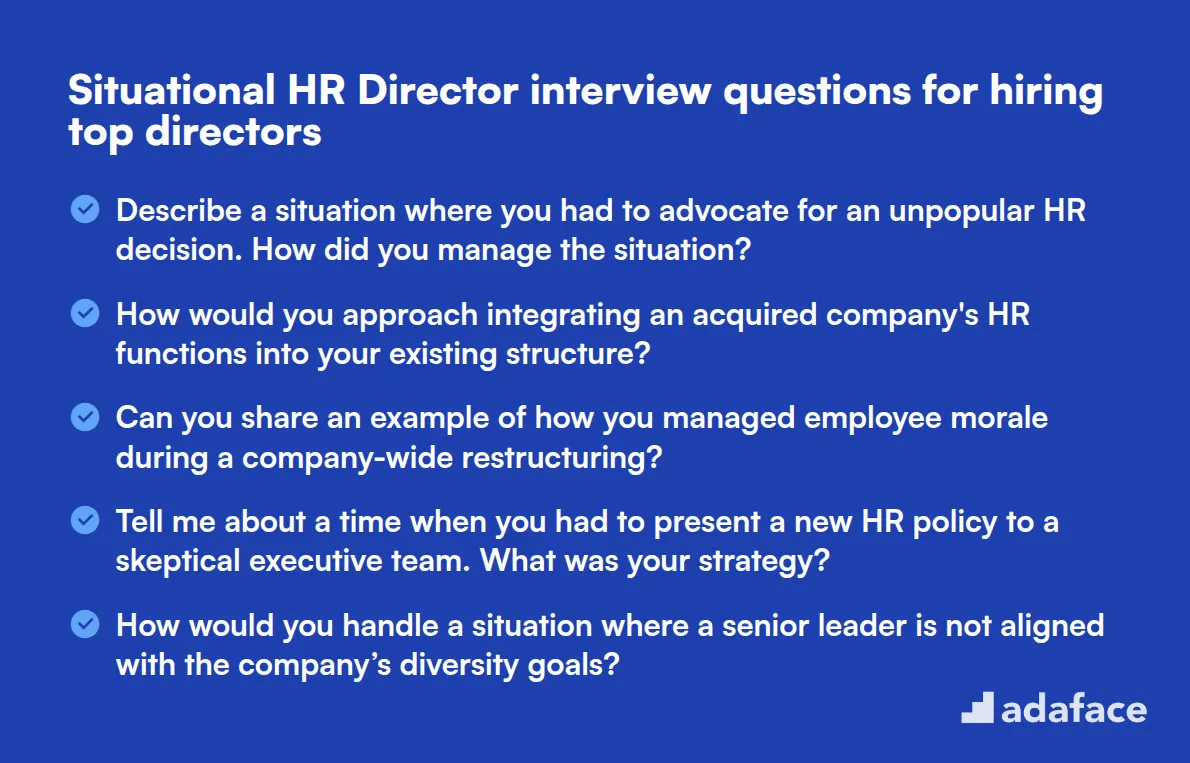
To ensure you select the best candidates for a HR Director role, using well-crafted situational questions can be key. These questions help assess how candidates think on their feet and handle real-life challenges, offering a glimpse into their problem-solving skills and leadership style.
- Describe a situation where you had to advocate for an unpopular HR decision. How did you manage the situation?
- How would you approach integrating an acquired company's HR functions into your existing structure?
- Can you share an example of how you managed employee morale during a company-wide restructuring?
- Tell me about a time when you had to present a new HR policy to a skeptical executive team. What was your strategy?
- How would you handle a situation where a senior leader is not aligned with the company’s diversity goals?
- What steps would you take if you discovered a discrepancy in the organization's pay equity reports?
- Imagine a scenario where your HR team is underperforming. How would you address this?
- How would you respond if an employee raised concerns about potential harassment involving a high-level executive?
- Describe a time when you had to pivot a strategic HR plan due to an unexpected business change. What did you do?
- How would you handle a situation where there is significant pushback on a new HR technology implementation?
9 behavioral HR Director interview questions and answers
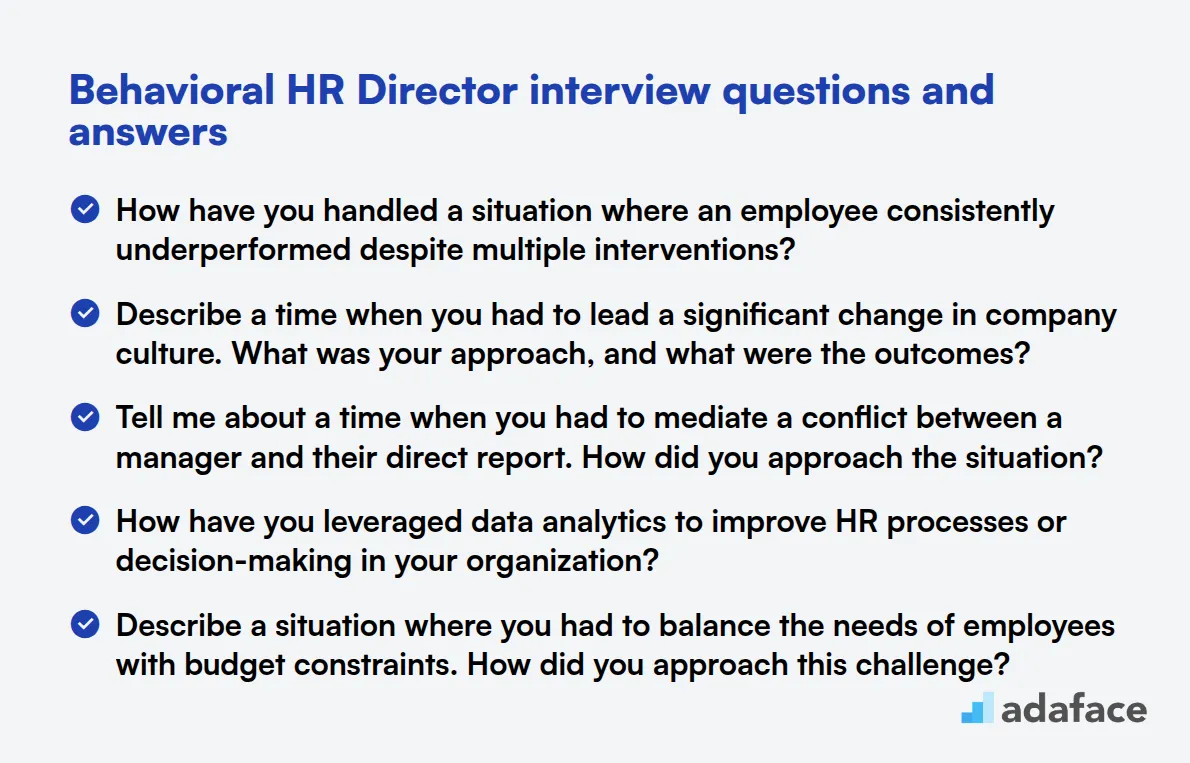
Behavioral interview questions are a powerful tool for assessing a candidate's past experiences and how they might handle future situations. When interviewing for an HR Director position, these questions can provide valuable insights into a candidate's leadership style, problem-solving abilities, and strategic thinking. Use the following list to delve deeper into your applicants' real-world experiences and decision-making processes.
1. How have you handled a situation where an employee consistently underperformed despite multiple interventions?
An effective HR Director should be able to describe a structured approach to performance management. They might outline steps such as:
- Conducting regular performance reviews to identify issues early
- Having open conversations with the employee to understand underlying causes
- Collaborating with the employee's manager to create a performance improvement plan
- Providing necessary resources, training, or mentoring
- Setting clear, measurable goals and timelines for improvement
- Documenting all steps and conversations throughout the process
Look for candidates who emphasize the importance of clear communication, fairness, and giving the employee opportunities to improve. They should also demonstrate an understanding of when it's necessary to consider termination if all other efforts have failed.
2. Describe a time when you had to lead a significant change in company culture. What was your approach, and what were the outcomes?
A strong answer should demonstrate the candidate's ability to drive organizational change. They might describe:
- Conducting a thorough assessment of the current culture and identifying areas for improvement
- Developing a clear vision for the desired culture change
- Creating a comprehensive communication plan to explain the reasons for change and expected benefits
- Engaging key stakeholders and forming a change management team
- Implementing changes in stages, starting with 'quick wins' to build momentum
- Regularly gathering feedback and making adjustments as needed
- Measuring the impact of changes through employee surveys and key performance indicators
Pay attention to how the candidate addresses resistance to change and their strategies for gaining buy-in from employees at all levels. An ideal response should also include specific examples of positive outcomes resulting from the culture change initiative.
3. Tell me about a time when you had to mediate a conflict between a manager and their direct report. How did you approach the situation?
An experienced HR Director should be able to describe a methodical approach to conflict resolution. They might outline steps such as:
- Meeting with each party separately to understand their perspectives
- Identifying the root cause of the conflict
- Facilitating a joint meeting to encourage open dialogue
- Guiding both parties towards finding common ground and mutually acceptable solutions
- Establishing clear action steps and follow-up procedures
- Documenting the process and agreements reached
Look for candidates who emphasize the importance of remaining neutral, maintaining confidentiality, and focusing on finding constructive solutions. They should also demonstrate an understanding of when to escalate issues if necessary and how to prevent similar conflicts in the future through policy changes or training initiatives.
4. How have you leveraged data analytics to improve HR processes or decision-making in your organization?
A forward-thinking HR Director should be able to provide concrete examples of using data to drive HR strategies. They might discuss:
- Implementing HR analytics tools to gather and analyze employee data
- Using predictive analytics to improve recruitment and retention strategies
- Analyzing performance data to identify trends and areas for improvement
- Conducting regular salary analyses to ensure competitive compensation
- Using engagement survey data to inform culture initiatives
- Tracking diversity and inclusion metrics to guide DEI programs
Pay attention to how the candidate balances data-driven insights with the human aspect of HR. They should demonstrate an understanding of data privacy concerns and ethical considerations when using employee data. Look for examples of how their data-driven approach led to measurable improvements in HR outcomes or business performance.
5. Describe a situation where you had to balance the needs of employees with budget constraints. How did you approach this challenge?
An effective HR Director should be able to demonstrate strategic thinking and creativity in resource allocation. They might describe:
- Conducting a thorough needs assessment to prioritize employee requirements
- Exploring cost-effective alternatives to expensive benefits or programs
- Negotiating with vendors or service providers for better rates
- Implementing phased approaches to new initiatives to spread costs over time
- Seeking employee input on preferences to ensure resources are allocated to areas of highest impact
- Clearly communicating decisions and rationale to maintain transparency
Look for candidates who show an understanding of the importance of employee satisfaction while also demonstrating fiscal responsibility. They should be able to articulate how they've found creative solutions to meet employee needs within budget constraints, and how they've managed expectations when certain requests couldn't be fulfilled.
Which HR Director skills should you evaluate during the interview phase?
Assessing a candidate for an HR Director position requires more than a single interview. While it's not feasible to gauge every potential trait or skill in a brief meeting, there are specific skills that stand out as critical for succeeding in the role. These include leadership, strategic thinking, communication, and talent management.
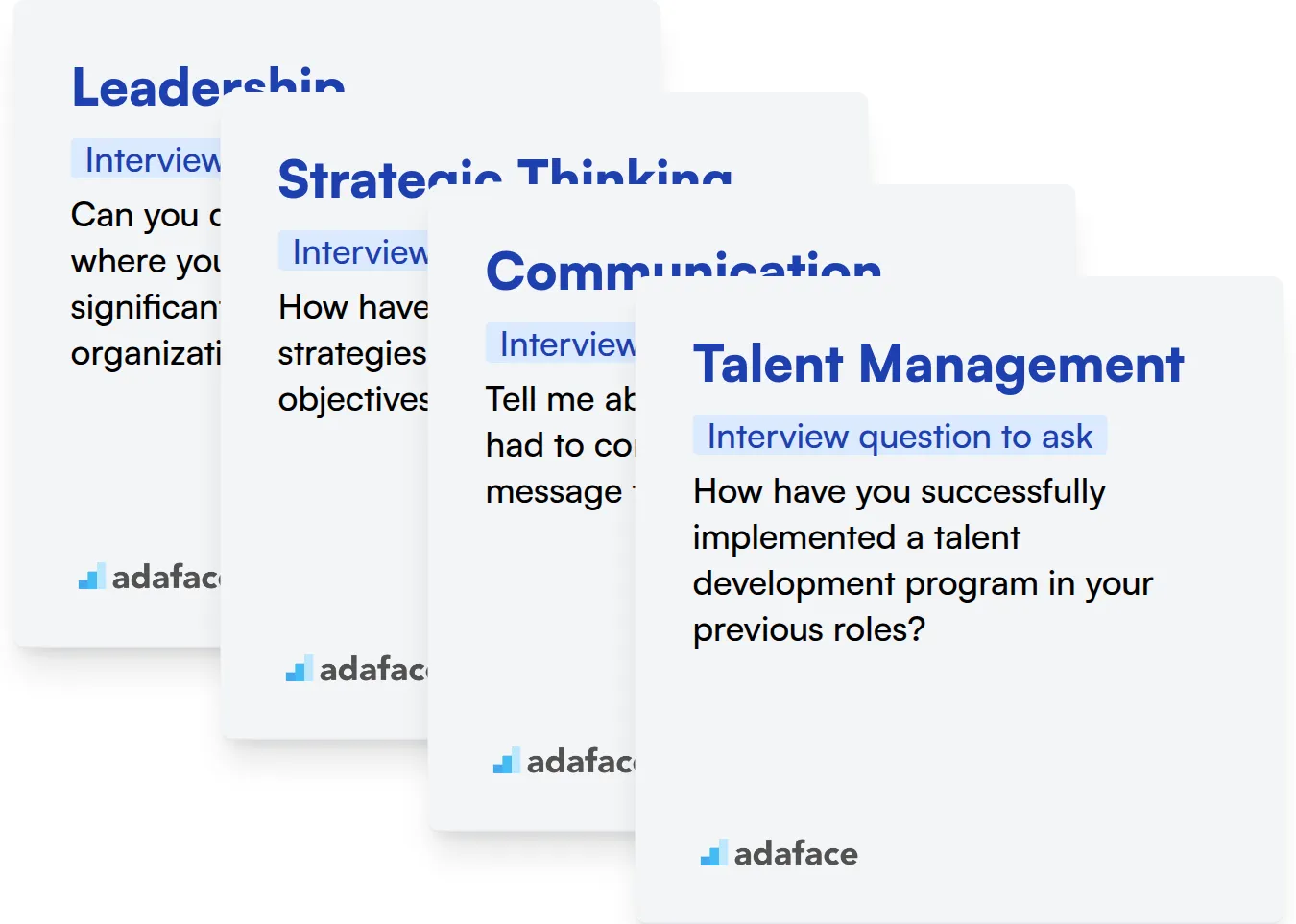
Leadership
Utilizing an HR Management test with multiple-choice questions can help identify individuals with strong leadership abilities. This kind of assessment can reveal how candidates think and react in leadership scenarios.
To further explore leadership skills, you can ask targeted interview questions to understand their approach and experiences.
Can you describe a situation where you successfully led a significant change within your organization?
Listen for examples where the candidate demonstrated initiative, communicated their vision clearly, and managed challenges effectively during the change process.
Strategic Thinking
You can evaluate the candidate's strategic thinking by asking specific questions that reveal their ability to plan and execute strategic initiatives.
How have you aligned HR strategies with overall business objectives in the past?
Look for responses that show a clear understanding of business objectives and the ability to translate them into actionable HR strategies.
Communication
A Communication Skills test with multiple-choice questions can assist in evaluating a candidate's proficiency in this area, assessing their ability to communicate effectively across different scenarios.
Consider asking questions that assess the candidate's communication style and effectiveness, especially in challenging situations.
Tell me about a time when you had to communicate a difficult message to your team.
Expect a detailed account of how they prepared for the communication, the approach they used, and how they handled any pushback or concerns.
Talent Management
Engaging candidates with a Talent Acquisition test can provide insights into their capability to manage talent effectively across the organization.
You can probe deeper into their talent management skills by facilitating discussions around past experiences and strategies.
How have you successfully implemented a talent development program in your previous roles?
Seek examples that highlight innovation, effectiveness, and measurable outcomes of the programs they managed.
3 Tips for Using HR Director Interview Questions
Before you start applying what you've learned, here are three tips to make the most of HR Director interview questions.
1. Leverage Skills Tests Before Interviews
Using skills tests before interviews helps narrow down the pool to candidates with the relevant qualifications, ensuring you spend time on the best prospects. Skills tests can provide a clear picture of a candidate's abilities in specific areas crucial to the HR Director role.
Consider using tests such as the HR Test for assessing general HR knowledge or the Leadership Psychometric Test to evaluate leadership capabilities.
Incorporating these tests into your process can streamline candidate evaluation, making interviews more focused and effective. This structured approach ensures you move on to the next steps with confidence.
2. Compile the Right Interview Questions
Time constraints in interviews mean you can't ask everything, so selecting the right questions is key to evaluating candidates effectively. Focus on questions that assess the critical skills and qualities needed for the HR Director role.
In addition to HR-specific questions, consider including questions related to communication and strategic planning. Check out related interview questions on topics like communication or critical thinking.
3. Ask Follow-up Questions
Interview questions alone might not reveal the depth of a candidate's experience. Follow-up questions are necessary to uncover genuine understanding and ability, especially if someone is embellishing their responses.
For example, if a candidate mentions a successful leadership project, ask, 'What were some challenges you faced, and how did you overcome them?' This question helps assess problem-solving skills and provides insight into the candidate's approach and resilience.
Use strategic planning interview questions and skills tests to hire talented HR Directors
If you're looking to hire someone with strong strategic planning skills, it's important to ensure they possess these skills accurately. The most efficient way to do this is by utilizing skills tests such as the Leadership Psychometric Test or the Critical Thinking Test.
Once you've implemented these tests, you can effectively shortlist the best applicants and invite them for interviews. To get started, consider signing up at Adaface or explore our test library for more relevant assessment options.
HR Test
Download HR Director interview questions template in multiple formats
HR Director Interview Questions FAQs
Key skills include strategic planning, leadership development, communication, and decision-making.
Situational questions assess how candidates handle real-life challenges, revealing their problem-solving abilities.
Strategic planning ensures alignment of HR goals with organizational objectives, driving long-term success.
Behavioral questions evaluate past behavior to predict future performance in similar situations.
These questions assess the candidate's ability to nurture and grow leadership talent within the organization.
Junior questions focus on foundational skills, while senior questions target strategic and high-level decision-making.

40 min skill tests.
No trick questions.
Accurate shortlisting.
We make it easy for you to find the best candidates in your pipeline with a 40 min skills test.
Try for freeRelated posts
Free resources




